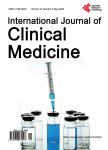Leptin and NUCB2/Nesfatin-1 in Acute Appendicitis
瘦素和急性阑尾炎NUCB2 /的nesfatin-1作者机构:Department of Pediatric SurgerySchool of MedicineFirat UniversityElazigTurkey Department of Medical BiochemistryAhievran UniversityKirsehirTurkey Department of Medical Biochemistry(Firat Hormones Research Group)School of MedicineFirat UniversityElazigTurkey Illinois Institute of TechnologyChicagoILUSA
出 版 物:《International Journal of Clinical Medicine》 (临床医学国际期刊(英文))
年 卷 期:2015年第6卷第12期
页 面:919-927页
学科分类:1002[医学-临床医学] 100214[医学-肿瘤学] 10[医学]
主 题:Leptin NUCB2/Nesfatin-1 Acute Appendicitis Biomarkers Children
摘 要:Objective: Appetite loss is seen in 90% to 95% of patients with acute appendicitis;however, the cause of this symptom remains unknown. This study is performed to determine whether changes in the blood levels of two anorexigenic hormones, leptin and NUCB2/nesfatin-1, can help to diagnose acute appendicitis in children and whether these two parameters can distinguish acute appendicitis from abdominal pain. Methods: Sixty children with comparable ages and body mass indices are divided into three groups of 20 children each: those with acute appendicitis, those with abdominal pain, and controls. The blood sample with acute appendicitis is taken preoperatively (T1), and subsequent samples are taken 24 hrs postoperatively (T2) and 3 days postoperatively (T3). The blood sample with abdominal pain subjects is also taken in the corresponding times with those with acute appendicitis while blood sample from controls is only taken in the T1 corresponding time. Leptin and NUCB2/nesfatin-1 levels are measured by enzyme-linked immunosorbent assay. Results: The serum leptin levels are significantly higher preoperatively than postoperatively in all three groups. The NUCB2/nesfatin-1 levels at T1 in acute appendicitis are significantly higher than those at T2 in all three groups, but are restored at T3 to levels similar to those of controls. Neutrophil percentage has a sensitivity of 100%, and specificity of 76.32%, NUCB2/nesfatin-1 level has a sensitivity of 47% and specificity of 95%, and the leptin level has a sensitivity of 64% and specificity of 51% in the diagnosis of acute appendicitis. Conclusions: High preoperative leptin and NUCB2/nesfatin-1 levels may be a causative factor for appetite suppression observed in patients with acute appendicitis. High preoperative and low postoperative serum leptin and NUCB2/nesfatin-1 concentrations may serve as new candidate biomarkers that help to distinguish acute appendicitis from abdominal pain in children in addition to high CRP concentr



